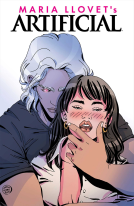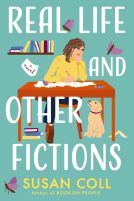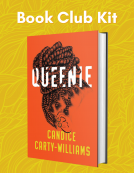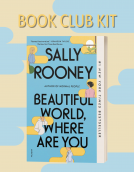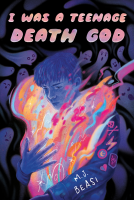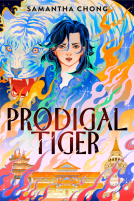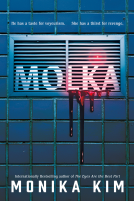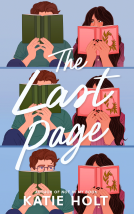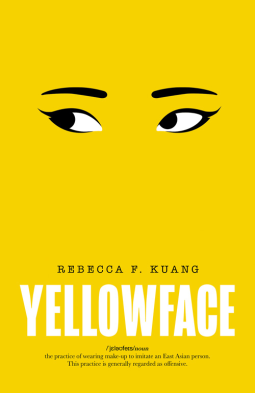
Yellowface
by Rebecca F Kuang
This title was previously available on NetGalley and is now archived.
Send NetGalley books directly to your Kindle or Kindle app
1
To read on a Kindle or Kindle app, please add kindle@netgalley.com as an approved email address to receive files in your Amazon account. Click here for step-by-step instructions.
2
Also find your Kindle email address within your Amazon account, and enter it here.
Pub Date May 25 2023 | Archive Date Jun 07 2023
HarperCollins Publishers Australia | The Borough Press
Talking about this book? Use #Yellowface #NetGalley. More hashtag tips!
Description
‘Addictive’ Grazia
‘Hugely entertaining’ Observer
‘Provocative’ Mail on Sunday
THIS IS ONE HELL OF A STORY.
IT’S JUST NOT HERS TO TELL.
When failed writer June Hayward witnesses her rival Athena Liu die in a freak accident, she sees her opportunity… and takes it.
So what if it means stealing Athena’s final manuscript?
So what if it means ‘borrowing’ her identity?
And so what if the first lie is only the beginning…
Finally, June has the fame she always deserved. But someone is about to expose her…
What happens next is entirely everyone else's fault.
‘The book that everyone is talking about’ Glamour
‘Ingenious, astute, hugely entertaining’ David Nicholls
‘Breathtakingly clever on jealousy, talent, success, and who gets to tell which story’ Elizabeth Day
‘Hard to put down. Harder to forget’ Stephen King
R.F. Kuang’s book Yellowface was a #1 Sunday Times bestseller w/c 04-06-23
R.F. Kuang’s book Yellowface was a #5 New York Times bestseller w/c 04-06-23
Available Editions
| EDITION | Other Format |
| ISBN | 9780008600303 |
| PRICE | |
Available on NetGalley
Average rating from 84 members
Featured Reviews
Kuang has done it again. This is a biting and satirical novel which explores the publishing industry and the writing process. Very metafictive and well-done. I enjoyed the unreliable narration and felt that it worked well in supporting Kuang's purpose of capturing the hypocrisy and double-standards of some writers.
This book was like driving past a car crash and not being able to look away and yet it had me questioning everything, and I was here for every second of it!
At the beginning of Yellowface I realised that June was an ass… but as she showed her true colours more and more I found myself trying to justify her choices, marking them down as mistakes.
But, I caught myself, witnessing my own thoughts and judging where my own privilege was informing the way I interpreted June’s thoughts and actions.
This woman was making deliberate, conscious decisions to improve her own world at the expense of others. She collected people, opinions and skewed her thoughts to justify each action, talking herself into believing it.
As I moved through the book I loved watching this asshole of a person digging herself a bigger and bigger hole, still trying to justify every action.
Yellowface is perfect for readers who play in the twitter, Booktok, bookstagram and booktube spaces as it offers an exploration of problematic authors, authors writing outside their lane, commentary on the publishing and representation of minority groups within popular fiction. All the things we engage in meaty discussion within these spaces.
…And THAT ending… was perfect. I will not spoil it… but it gave me what I wanted.
Thank you Netgalley, the Author and the Publisher for this ARC, all thoughts are my own and given voluntarily.
 Marianne V, Reviewer
Marianne V, Reviewer
“People always describe jealousy as this sharp, green, venomous thing. Unfounded, vinegary, mean-spirited. But I’ve found that jealousy, to writers, feels more like fear. Jealousy is the spike in my heartrate when I glimpse news of Athena’s success on Twitter”
Yellowface is the fifth novel by award-winning, best-selling Chinese author and translator, Rebecca F Kuang. Juniper Hayward and Athena Liu take many of the same classes at Yale, but after that, their paths diverge. Athena, as June sees it, is a beautiful, Yale-educated, international, ambiguously queer woman of colour who, by the age of twenty-seven, has three best-sellers under her belt and has just scored a Netflix contract. June is just a plain, straight white girl from Philly: her one novel tanked, and she’s tutoring rich kids for the SAT to make rent.
While they basically have only skin-deep friendship, more a product of proximity than connection, Athena invites June to celebrate with her. That includes a lot of whiskey and, in the ensuing silliness, despite June’s best efforts, Athena chokes to death. The only copy of her just-finished manuscript, sitting there on Athena’s desk, is too much temptation for June, who puts it in her bag and takes it home.
June works quite hard on turning this first draft into a publishable work, and she quickly begins to believe her own justifications for doing so. Her agent is impressed and lines up an enthusiastic publisher. The advance is generous. Her editor suggests some changes to make the book less confronting, but that also soften Anthea’s strong stance on this difficult topic. June readily agrees: she firmly believes that “Reading should be an enjoyable experience, not a chore”
Because the book is about the treatment of Chinese laborers fighting on the side of the British in World War One, and June is not Chinese, she decides on a pseudonym using her middle name: Juniper Song, hoping to bypass the touchy issue of cultural authenticity mentioned by her publisher. She also rejects outright having a sensitivity reader check the manuscript.
The Last Front hits the New York Times bestseller list and June is enjoying the sort of recognition that Athena had. And then, allegations of plagiarism hit the Twittersphere. Is this the end of June’s career in writing?
There’s a delicious irony in a Chinese author writing a white protagonist who has appropriated a Chinese woman’s work to pass off as her own. Kuang explores the vexed question of cultural appropriation, touching on morally grey areas such as who has the right to write about what. Racism, misogyny, and xenophobia are all aired, and she does it all with such eloquent prose.
Her characters are complex and flawed, and neither June nor Athena is particularly likeable, but Kuang somehow gets the reader totally invested in June’s fate: will she get away with it? Do we want her to?
Kuang gives the reader a compelling insight into the publishing industry, and demonstrates the huge influence that social media can have. She also throws in a dramatic climax. This is a twisty tale that’s hard to put down: clever and thought-provoking, polarising and often darkly funny.
This unbiased review is from an uncorrected proof copy provided by NetGalley and Harper Collins.
This is going to be the best book of the year! I am so excited for everyone to read it. It was unique, different and it really made you think. Five out of five stars.
To sum it without too many spoilers because this one is best read with absolutely no idea what you’re walking into! This is a brutal critique of the publishing industry, and what is to be a person of colour navigating white spaces. Kuang doesn’t hold back. Our “protagonist” June Hayward, a mediocre white author with a failed debut is frenemies with Asian bestselling author, Athena Lui. After a freak accident, where Lui unfortunately dies, June steals her manuscript and publishes it as her own.
The more I read it, I found myself worrying that June will get caught! And then I’m like WAIT A MINUTE she should get caught!!!! This book is everything dark, satirical and oh so meta. We dive into the mind of a white women who is just so OBLIVIOUS to her surroundings. She whitewashes a book on Chinese concentration camps, she changes her name to a more ambiguous one where people can’t tell if she’s Asian or not, she continues to profit on the trauma and tragedies of minorities without a care in the world.
This is a really fast-paced book that just pulls you in! But the middle does slow down a bit and gets super meta. I enjoyed all the commentary on Goodreads, twitter, and the book community. I loved how Kuang referenced authors reading reviews online cause ya know that’s just a big no no.
I also liked how the book critiques WHO gets to write what stories. Are POC/minorities only allowed to write about trauma, are those the stories that are sell well? What about writing outside your lived experiences? A Chinese-American author writing about Korean War survivors? Or should they just stick to what they know? Do books about the war only sell when there’s a white saviour/hero in the mix???? I can give you a handful of examples I’ve read by authors of colour who whitewashed their stories to make it plateable to white readers lol! Or simply when they paint the white guy as the hero 😗
I've read two Kuang books in back to back months and they've both left me in the same state. Dazed, amazed, and utterly spent.
While Babel is a 550 page historical fantasy tome, Yellowface is a slim and snarky contemporary satire about the racism and bullshit in the publishing industry. In both stories, Kuang not so subtly condemns white supremacy in extremely blatant but clever ways.
You may be wondering why I keep referring to Babel in my review of Yellowface but I do think these two texts are so closely linked. Separated by two centuries, these stories told in two completely different genres are so different in form and voice but so similar in theme and message. Not to mention I found two Babel easter eggs in Yellowface!
Our main character in Yellowface, Juniper, is a modern reincarnation of Letty (Babel), with white supremacy undertones and victim mentality overtones. Everything Juniper says to justify her actions to herself digs her into an even deeper hole in the reader’s eye. She is constantly contradicting something she said previously, setting double standards for herself and Athena, and acting like a bombastically entitled hypocrite throughout. Her feral inner monologue that churns out microaggression after microaggression sometimes feels comically overdone, but upon looking around the real world, a reader can draw the conclusion that this is a satire that hits way too close to the truth. Kuang toes this line expertly, while it’s sickening to watch unfold it’s simultaneously impossible to look away.
Yellowface is fast paced, unputdownable, and a perfect binge read for any season or occasion. I read it in 24 hours and similar to when I finished Babel, really didn’t know what to do with myself after. The post-Kuang afterglow really is a debilitating state of being.
4 stars! Thanks NetGalley for the review copy!
this book is gonna make people mad and force them to recognise their own internal biases.
Yellowface is very meta about book reviews and twitter.
And calls out systemic and internalised racism.
This book is a whirlwind and a chaotic mess in the best way possible. It’s one of the best unreliable narrators I’ve ever read. It tackles so many themes and looks at who can and cannot tell certain stories.
Overall I really enjoyed it, it’s messy, fast-paced and engaging. But there were some parts I didn’t enjoy or felt off. Which I can’t get into much detail without spoiling. One part was that there were also about 5-6 HP/JKR references which I didn’t like. In my opinion, it was part of the satire and to show how wrong June is. But I still would rather they be removed and have something else to carry the same sentiment in its place.
If you’ve seen the movie ‘Not Okay’ this is similar in many ways. A white woman lies/ steals an experience for fame/ social clout and excelling her career.
This is a dark, satirical comedy. It leaves you mad and angered at both our narrator and the publishing industry/ book Twitter. It’s such a fun and engrossing read. I loved some of the references to pop culture, such as the exorcist stairs (iykyk). But I have a feeling it could age poorly, but that does happen with all books with pop culture references.
Yellowface focuses and hones in on writing and the publishing industry, highlighting the inner workings of it. All the characters symbolise a part of the industry and I appreciated the tie in of social media and modern issues in this story. The dark satire was brilliantly executed. Kuang writes incredible morally gray characters, pretty much every character in this book has ambiguous and unreliable intentions which factors in on their realism, she manoeuvres the characters and their decisions in a way where you genuinely could not form a decision and opinion about them, yet also simultaneously making you feel for the characters at times. You never truly know what to expect from them and where the story will lead, there were so many masterminded breadcrumbs and trails that formed an overall picture of the story. June was so aware of the inherent wrongness of her doings yet she believes herself deserving to reap the rewards, it was introspective to witness the battle of morals. Kuang incorporated and provided a commentary of the element of race into this book in a seamless way, navigating the racist debates and their response in the business on the always-contentious subject of cancel culture, providing an insightful perspective. Yellowface is a tale about the falsehoods people tell themselves to justify their actions, the mythology they create around themselves to get by in the world and the lengths a person will go to in order to reinvent themselves.
What. Did. I. Just. Read.
I loved seeing what life is like for authors - Yellowface offers a rare glimpse into the publishing world. Kuang calls it like she sees it in her descriptions of everyone Juniper works with.
& then she hits you with the paranoia - I’m literally questioning my own sanity after reading Yellowface.
I. Couldn’t. Get. Enough.
It’s … I don’t even know the right word. Heart racing? Anxiety-inducing? Literally Insane.
Moral of the story - don’t mess with anyone.
Shoutout to Netgalley & HarperCollins for the ARC.
Yellowface comes out May 25th, & I highly recommend pre-ordering. It’s highly anticipated & lives up to its hype.
ARC received in exchange for an honest review
I'm really struggling with this one. For a majority of the book it was 4.5-5 stars in my mind, only really losing me in certain moments (most of those involving somewhat oversimplifications of certain theory and discourse such as about domestication vs. foreignisation in the translation field). I agreed with all the points she was making, but I think I was skewed towards seeing it as a little 'shallow' from the perspective of a masters of interp. & translation student who has had to scour over such theory in detail. I can now definitely recognise that the way Rebecca wrote about it was really inclusive and effective for people outside the field and is much better at getting a general audience thinking about the themes and implications.
Now that aside, I was REALLY loving most of this book and I absolutely adore R.F. Kuang's narrative voice and writing style, not to mention she's an absolute idol of mine in both the fields of translation and literature particularly in her vocal condemnation of the anglophone British/American hegemony in the publishing and translation industries and her representation of 'transfiction' and guilt of the colonised translator in Babel. So I already had quite a strong bias towards loving this book before I even started, and to be honest this was my easiest read in a long time because I was just devouring the pages. However, I was struggling to articulate why, when I reached the final chapters, I was feeling a vague sense of dissatisfaction. I can't tell if I was just disappointed because it was over or because I was expecting something a little more climactic or not, but I think I settled on the fact that the climax really was earlier on, and then we get to be along for the ride on this downward spiral. So although I ended it thinking more along the lines of 3.5-4 stars, I think my reflection of the story, the important place it holds in the industry, and also that last chapter and implied direction brought it back up.
I can also already imagine some criticisms about the satire or criticism being too heavy handed or blatant etc., but I would argue that's entirely the point and one which Rebecca even brings up at one point from the perspective of Juniper to pre-emptively combat this very argument. Also, although I think some other reviews had a point about the characters feeling a little too much like 'characters' and not people, I do see both sides of this. I think they were supposed to be slightly exaggerated caricatures of these real figures in the industry and that is also entirely the point. I also don't completely agree they were shallow depictions, because no one was a truly 'good person' and I love that (especially as someone who doesn't mind reading from the villain's perspective like this). They felt real in that sense, a character who is morally in the right is also completely unlikable at times and does some f*cked up things, a character who is morally in the wrong has moments that humanised them (albeit not for long and for good reason), and characters who were done completely dirty by other characters were not immune to themselves also acting deranged, albeit as a fairly justifiable response to the mistreatment. I personally thought it was a thoughtful examination of how there cannot be a 'perfect victim', and perhaps also that the juxtaposition that even someone who might be considered a successful author of 'diversity' but also a 'bitch' in the industry is anchored to the same tokenism and is just doing the best she can, and yet the book also examines her exploitation of other and even herself.
Athena. She absolutely haunted this novel in the best way, and her relationship with all the other characters made this so complicated. I also really liked the character of Juniper. And by that, I mean I like that I hated her but also couldn't bear to see her caught out. Not because I think what she did was in any way acceptable, but because I have an innate inability to process second-hand embarrassment (often having to skim scenes in books/media that make my entire body clench second-hand embarrassment or anxiety), so I was enthralled in this paradox of wanting her to be exposed for what she did (although that desire became intentionally complicated throughout) and also writhing in metaphorical pain as the thread was unravelling before my eyes.
However, I think where I was lost a bit was during the Twitter discourse. Anyone who spends a decent amount of time online is aware of Twitter discourse and the various stances on 'cancelling' and the surrounding drama, and although I did enjoy that important inclusion here, I did think it dragged on just a little too long in my opinion. It got a little lost in the sauce and took me out of the immersion a little. It's not to say it wasn't an accurate depiction, because I have no doubt whatsoever the R.F. Kuang is much more in the know about the online going-ons of the literary world than myself, but it just didn't connect with me as much as the other 80% of the story.
In short, I absolutely think everyone should read this (petition for R.F. Kuang as required reading in every school everywhere), though I'm not sure the people who probably need to read this the most will take away from this what they should, and in any case may consider it a personal attack on them somehow. However, I'm glad R.F. Kuang said what she said, and said it with her whole chest, and upon a little more reflection I think it easily still deserves at least 4-4.5 stars. Such an important read about such an important discussion, and I can't wait to re-read this after further reflection.
June Hayward and Athena Liu met at college and bonded over a shared love of writing. But while Athena became a literary darling with multiple awards, best sellers, and now a Netflix series, June's writing career has slumped. Her debut novel barely sold a few thousand copies and she's about to be dropped by her agent. When Athena dies in front of June in a freak pancake accident, June takes Athena's latest, unseen manuscript, reworks parts, and publishes it under her new, ethnically ambiguous name Juniper Song. Finally June has the success she always knew she deserved but she can't escape the shadow of Athena.
Told from a first person narrative we live in June's mind as she learns the secrets of the publishing industry (best-sellers are chosen before they're ever released and no one cares about morality if the book are selling), experiences the highs and lows of social media, and faces continued backlash for cultural appropriation and accusations of plagiarism. June is not a good person so it was interesting to read the mental gymnastics required for her to justify everything that's happened (it's not plagiarism because she rewrote the novel, it's not cultural appropriation because she did her research and besides, Athena wrote it). This is an insightful story which explores who is allowed to tell which stories, bias in publishing, and the pitfalls of social media. Kuang's writing is amazing, it is so enthralling and brilliant. She shows the nuances of writing POC characters and stories, and the pitfalls white writers can fall into when creating diverse characters without adequate research or sensitivity, and the complete lack of diversity within the publishing industry. While June is an unsympathetic narrator she still provides interesting commentary on the vulture like nature of writers, wondering if anything is original or even "their" story to tell. To be honest, the basic premise of the book reminded me of The Plot by Jean Hanff Korelitz and although they are very different scenarios of story theft and quite different outcomes, it is a similar premise, so maybe she is right and there are no original ideas, just good books, bad books, popular authors, and unlucky authors.
I truly enjoyed this book and devoured it in a day however the ending fell a bit flat. It almost felt like R.F Kuang didn't know how to wrap it up so she just... stopped. Apart from that it was fantastic.
Thanks to NetGalley and HarperCollins for the ARC
Readers who liked this book also liked:
We Are Bookish
Literary Fiction, Multicultural Interest, Women's Fiction
We Are Bookish
General Fiction (Adult), Literary Fiction, Women's Fiction
Silvia Moreno-Garcia
Historical Fiction, Literary Fiction, Sci Fi & Fantasy
